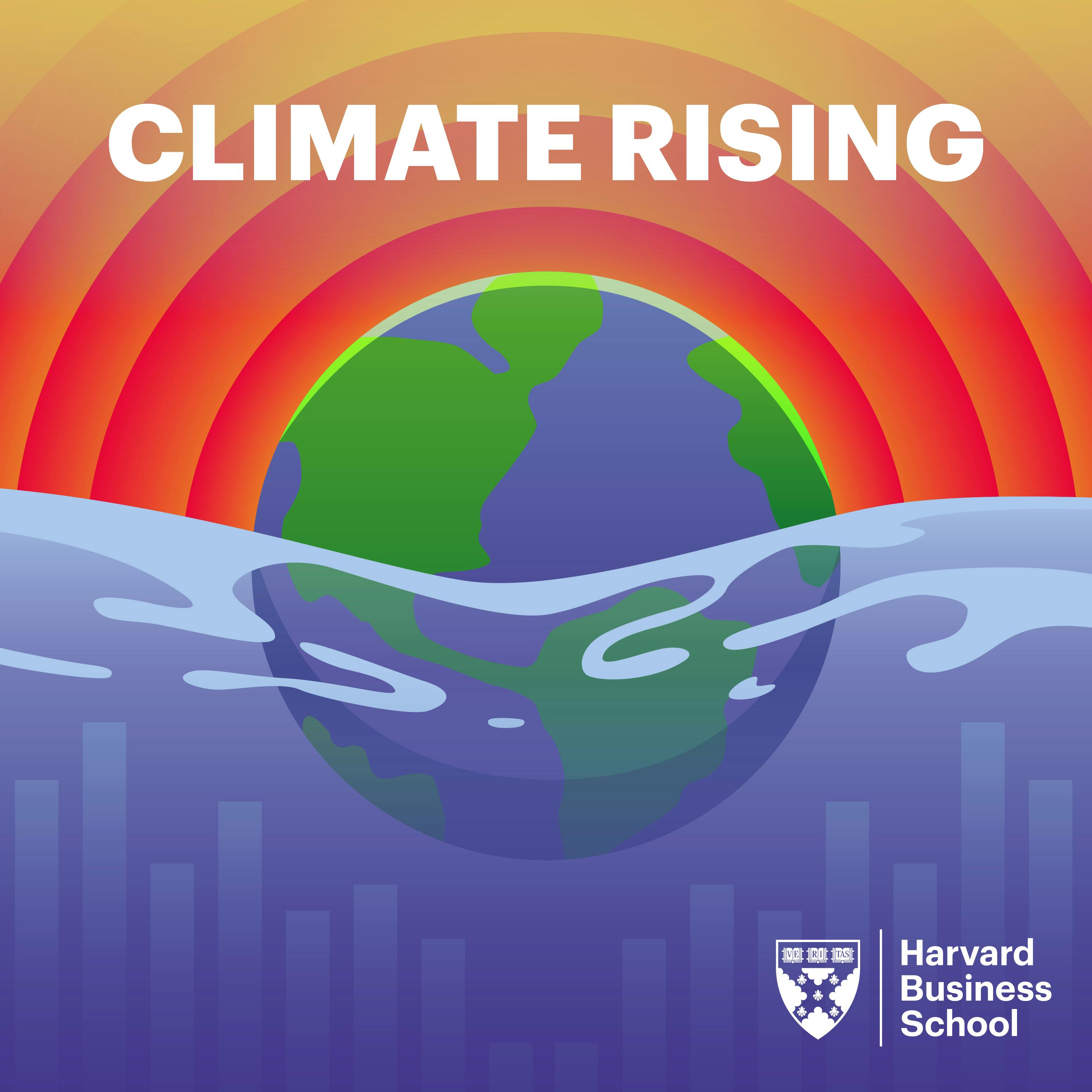

Climate Rising
Harvard Business School Business & Environment Initiative
Climate Rising is about the impact of climate change on business. It brings business and policy leaders and Harvard Business School faculty together to share insights about what businesses are doing, can do, and should do to confront climate change. It explores the many challenges and opportunities that climate change raises for managers, such as decisions about where they choose to locate, the technologies they develop and use, their strategies with respect to products, marketing, customer engagement, and policy—in other words, the full spectrum of business concerns.
Episodes
Mentioned books

Apr 8, 2021 • 27min
Bringing Scale Capital to Climate Game-Changers: David Crane, Climate Real Impact Solutions SPAC
David Crane tried to lead the NRG utility to transition from fossil fuel energy sources, but was ousted in 2015. He shares his lessons learned, reflects on what’s changed since then, and describes his newest venture raising funds for a climate-tech SPAC.
Apr 1, 2021 • 35min
Investing in No-Sacrifice Models for Climate: Nancy Pfund, DBL Partners
Nancy Pfund is founder and managing partner of DBL Partners, one of the first and largest impact investing venture capital firms in the world. DBL seeks to achieve “Double Bottom Line” results for its investors: top tier financial returns as well as meaningful social and environmental impact. It currently holds over $400 million in assets under management. Through her early stage investments in Tesla and support for companies in sectors from fashion to agriculture, Nancy has shaped the field of impact investing and demonstrated the power of venture capital to address climate change. In this episode, she describes the how she identifies double-bottom-line opportunities and some of the companies she's excited to be investing in now.

Jul 7, 2020 • 31min
Financial Regulation and Climate Risk Management
Explore different approaches to modeling and managing climate risk from the vantage points of industry leaders Robert Litterman, a seasoned risk management expert; Nushin Kormi, a specialist in sustainable finance; and Kevin Stiroh, a financial regulator. The discussion, moderated by Professor Ramana Nanda, focuses on the concept of transition risk—the potential consequences if climate regulations are imposed gradually or suddenly—and investment strategies to prepare for and mitigate this risk. This is one of 4 new episodes this summer based on live content from the Harvard Business School Climate Risk conference held earlier in 2020.

Jul 7, 2020 • 45min
Uncovering and Pricing Climate Risk
How do managers within the different sectors of financial services identify and value climate risk? Professor George Serafeim talks with an asset manager, an insurer, a hedge fund manager, and an investment banker about their approaches to identifying and valuing climate risk. The discussion highlights both the bridges and the gaps between ESG metrics and climate risk management. This is one of 4 new episodes this summer based on live content from the Harvard Business School Climate Risk conference held earlier in 2020.

Jul 7, 2020 • 23min
Incorporating Climate Risk in Pension Fund Investment Decisions
Hiro Mizuno, former head of the Japanese Government Pension Investment Fund (GPIF), and Professor Vikram Gandhi discuss the steps GPIF has taken to incorporate climate risk in its investment process. Mizuno highlights the need to address the entire investment universe and challenges of his approach. This is one of 4 new episodes this summer based on live content from the Harvard Business School Climate Risk conference held earlier in 2020.

Jul 7, 2020 • 24min
Leading State Street Corporation in the Era of Climate Change
State Street Chairman & CEO Ron O’Hanley describes leading one of the world’s largest financial institutions in the era of climate change. In a discussion moderated by Professor George Serafeim, he describes the roles of asset managers, shareholders, and asset owners with a focus on the concept of values vs. value in approaches to investment decisions. This is one of 4 new episodes this summer based on live content from the Harvard Business School Climate Risk conference held earlier in 2020.

Dec 20, 2019 • 27min
Climate Change Challenges Facing the Real Estate Industry
The real estate industry faces climate change challenges like difficult financing in coastal cities, more stringent regulations on where and how to build, and the need to retrofit existing properties to reduce emissions. Bryan Koop of Boston Properties, one of the largest commercial real estate development companies in the country, and Professor Arthur Segel discuss the climate change challenges confronting the real estate industry.

Dec 16, 2019 • 38min
Working with Companies and Investors to Address Climate Change
How will a warming climate affect a company’s bottom line? How can groups like Ceres help persuade shareholders, CEOs, and their boards to use their influence to address climate change? Mindy Lubber of Ceres and Professor Rebecca Henderson at Harvard discuss the difficult changes businesses must make now—taking a systems approach, setting long-term goals, and including sustainability metrics in their compensation systems—in order to mitigate the risks of climate change.

Dec 6, 2019 • 30min
Developing the Wind Industry
Wind power has more than tripled in the United States over the past decade. It's now the largest source of renewable energy in the country, accounting for more than 6% of the nation's electricity. The wind industry faces potential hurdles, however, with federal tax credits scheduled to start phasing out and delays in building major offshore wind farms. Francis Slingsby of Orsted, a global leader in offshore wind, discusses how the U.S. and the world is developing the wind industry and what the future looks like.

Dec 2, 2019 • 38min
Increasing Solar Power
Is increasing solar power the answer? Abby Hopper, president and CEO of the Solar Energy Industries Association, and Professor Joe Lassiter discuss how to deliver reliable, clean, low cost power for people everywhere.


